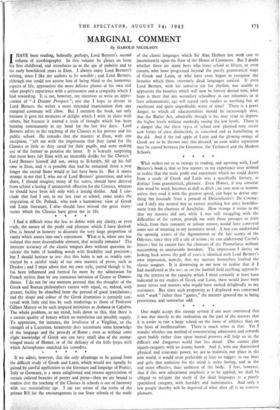If we admit, however, that the only advantage to be
gained from the difficult study of Greek and Latin, which would not equally be gained by careful application to the literature and language of France, Italy or Germany, is a more enlightened and intense appreciation of certain isolated beauties of poetry and prose—then we are bound to confess that the teaching of the Classics in schools is out of harmony with our materialistic age. I am not aware of the terms of the private Bill for the encouragement in our State schools of the study of the classic languages which Sir Alan Herbert last week cast so incontinently upon the floor of the House of Commons. But I doubt whether there are many boys who leave school at fifteen, or even sixteen, who have progressed beyond the purely grammatical stage of Greek and Latin, or who have even begun to recognise the beauties which those extremely dead languages conceal. If even Lord Berners, with his sensitive ear for rhythm, was unable to appreciate the beauties which will now be forever denied him, what hope is there that any secondary schoolboy in our inhuman, or at least unhumanistic, age will regard such studies as anything but an exorbitant and quite unprofitable waste of time? There is a grave danger, to which all educationalists should be increasingly alive, that the Butler Act, admirable though it be, may tend to depress the higher levels without markedly raising the low levels. There is a danger that the three types of school now planned may create new forms of class distinction, as conceited and as humiliating as the old. And if the red apple of Latin and the glowing orange of Greek are to be thrown into this discord, an even wider separation may be caused between the Grammar, the Technical and the Modern Schools.






















 Previous page
Previous page